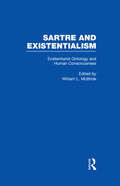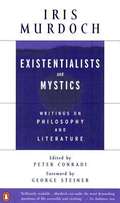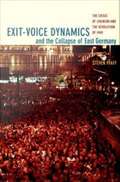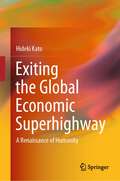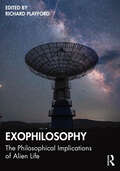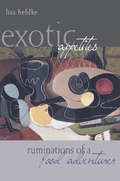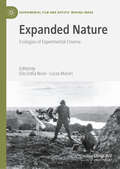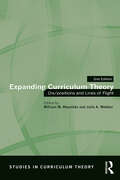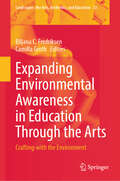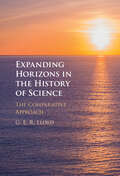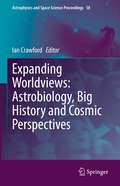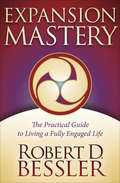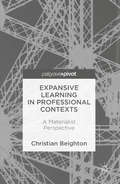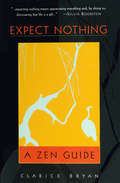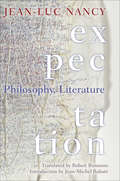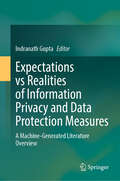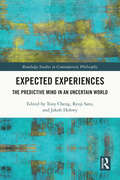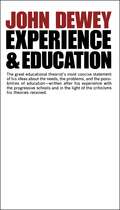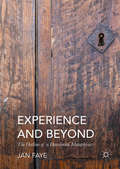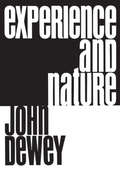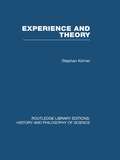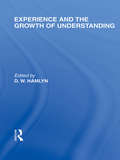- Table View
- List View
Existentialism: Bullet Guides
by Robert AndersonOpen this book and you will Understand existential thought Learn about the founders Clarify difficult concepts Examine its relevance
Existentialist Ontology and Human Consciousness: Philosophy, Politics, Ethics, The Psyche, Literature, And Aesthetics: Existentialist Ontology And Human Consciousness (Sartre and Existentialism: Philosophy, Politics, Ethics, the Psyche, Literature, and Aesthetics)
by William L. McBrideExistentialist Ontology and Human ConsciousnessThe majority of the distinguished scholarly articles in this volume focus on Sartre's early philosophical work, which dealt first with imagination and the emotions, then with the critique of Husserl's notion of a transcendental ego, and finally with systematic ontology presented in his best-known book, Being and Nothingness. In addition, since his preoccupation with ontological questions and especially with the meanings of ego, self, and consciousness endured throughout his career, other essays discuss these themes in light of later developments both in Sartre's own thought and in the phenomenological, hermeneutic, and analytic traditions.
Existentialists and Mystics
by Iris MurdochBest known as the author of twenty-six novels, Iris Murdoch has also made significant contributions to the fields of ethics and aesthetics. Collected here for the first time in one volume are her most influential literary and philosophical essays. Tracing Murdoch's journey to a modern Platonism, this volume includes incisive evaluations of the thought and writings of T. S. Eliot, Jean-Paul Sartre, Albert Camus, Simone de Beauvior, and Elias Canetti, as well as key texts on the continuing importance of the sublime, on the concept of love, and the role great literature can play in curing the ills of philosophy. Existentialists and Mystics not only illuminates the mysticism and intellectual underpinnings of Murdoch's novels, but confirms her major contributions to twentieth-century thought.
Existing: An Introduction to Existential Thought
by Steven LuperThis anthology gathers a wide variety of excerpts from the existential and phenomenological writings of the 19th and 20th centuries. Luper provides a brief history of the existential movement, as well as introductory essays to each chapter.
Exit-Voice Dynamics and the Collapse of East Germany: The Crisis of Leninism and the Revolution of 1989
by Steven PfaffWinner of the Social Science History Association President's Book Award East Germany was the first domino to fall when the Soviet bloc began to collapse in 1989. Its topple was so swift and unusual that it caught many area specialists and social scientists off guard; they failed to recognize the instability of the Communist regime, much less its fatal vulnerability to popular revolt. In this volume, Steven Pfaff identifies the central mechanisms that propelled the extraordinary and surprisingly bloodless revolution within the German Democratic Republic (GDR). By developing a theory of how exit-voice dynamics affect collective action, Pfaff illuminates the processes that spurred mass demonstrations in the GDR, led to a peaceful surrender of power by the hard-line Leninist elite, and hastened German reunification. While most social scientific explanations of collective action posit that the option for citizens to emigrate--or exit--suppresses the organized voice of collective public protest by providing a lower-cost alternative to resistance, Pfaff argues that a different dynamic unfolded in East Germany. The mass exit of many citizens provided a focal point for protesters, igniting the insurgent voice of the revolution. Pfaff mines state and party records, police reports, samizdat, Church documents, and dissident manifestoes for his in-depth analysis not only of the genesis of local protest but also of the broader patterns of exit and voice across the entire GDR. Throughout his inquiry, Pfaff compares the East German rebellion with events occurring during the same period in other communist states, particularly Czechoslovakia, China, Poland, and Hungary. He suggests that a trigger from outside the political system--such as exit--is necessary to initiate popular mobilization against regimes with tightly centralized power and coercive surveillance.
Exiting the Global Economic Superhighway: A Renaissance of Humanity
by Hideki KatoThis book tackles global economic and social issues from a perspective that may seem obvious but which no author has yet taken: that we humans are living beings. In today’s artificially globalized world, we have increasingly lost sight of our original humanity. Despite the serious environmental, social, and political problems we are facing, we cannot stop focusing on economic growth, efficiency, and liberalization. In doing so, we continue to make the world “slicker” and more unstable. This book identifies these conventional values and ways of thinking as the root cause underlying many of today’s challenges, and it offers the perspective of a “bumpier” and more organic human existence that provides a greater sense of traction and stability. The book begins with a discussion of global systems and structures, proposing a “world with two systems” to limit the effects of artificially constructed globalization. The second part examines the modern welfare state, outlining a process to revive democracy and social capital by making social issues the business of everyday citizens. The third and final part focuses on human well-being, emphasizing physicality and the Japanese concept of kata as keys to restoring our humanity. Rather than searching for specific solutions through specialized knowledge, this book makes use of the author’s broad perspective acquired through many years of public policy research and reform. It asserts that knowledge should be acquired through hands-on experience and in studies based on real-world situations, involving people at the forefront of society’s challenges, whether politicians, businesspeople, scientists, craftspeople, or farmers. In both its analysis of humanity’s problems and the solutions it offers, this book takes an entirely new yet utterly natural approach to steering humanity off the global economic superhighway.
Exophilosophy: The Philosophical Implications of Alien Life
by Richard PlayfordThis volume addresses philosophical questions raised by the possibility of alien life and extraterrestrial intelligence. The different philosophical perspectives and approaches presented across the chapters will provide a foundation for future work on exophilosophy.Interest in space, space exploration, and alien life has never been greater. In popular culture, for example, it has proven a persistent theme in science fiction films (e.g., Star Trek, Star Wars), books (e.g., H. G. Wells, Arthur C. Clarke, Ray Bradbury), and computer games (e.g., Sid Meier’s Alpha Centauri), as well as bestselling ‘non- fiction’ books (von Däniken’s multimillion-selling Chariots of the Gods?), and hit ‘documentary’ shows (e.g., Ancient Aliens). There has also been persistent interest in these topics amongst scientists with organizations such as NASA and SETI having an enormous impact on both the scientific and popular imagination. Yet, curiously, the topic has received relatively little philosophical attention. Whilst certain aspects of these topics remain within the proper purview of the sciences, a host of philosophical questions are raised by the possibility of alien life and extraterrestrial intelligences, and the possibility of our coming into contact with them. This collection of essays will examine some of these questions whilst laying the groundwork for future study in an as-yet under-researched area of philosophy.Exophilosophy is essential reading for scholars and students with an interest in space and philosophy, especially those working in philosophy of science, metaphysics, epistemology, ethics, philosophy of language, and philosophy of religion.
Exotic Appetites: Ruminations of a Food Adventurer
by Lisa HeldkeFirst published in 2003. Routledge is an imprint of Taylor & Francis, an informa company.
Expanded Nature: Écologies du cinéma expérimental (Experimental Film and Artists’ Moving Image)
by Elio Della Noce Lucas MurariThis book explores the emergence of ecological consciousness in the work of contemporary experimental filmmakers. If it can be said that experimental filmmakers are "expanding" the artistic field through an exploration of the potencies, modes of dissemination and performance of the moving image, in the Anthropocene these practices strive for another kind of expansion: to expand our experience of nature. Appending flowers to the film strip or burying it in the ground, inventing observational devices, allowing the camera to be affected by natural forces, engaging one's own filming body in a symbiotic relationship with the environment, reconstituting ecosystems at the moment of projection: the ecologies of experimental cinema presented in this book constitute forms of practice and engagement that awaken a heightened sensibility towards the living world through cooperative links, casting other beings as subjects and agents of filmic processes, and, finally, reshaping the economy of filmmaking. Thus, ecologies of perception, medium, production, and multinaturalism are deployed, contributing to the restoration of our sensory bond with the natural world. Several chapters were translated with the help of artificial intelligence. In each case, the text has subsequently been revised further by the author as well as the translator Charlie Hewison and a professional copy editor.
Expanding Curriculum Theory: Dis/positions and Lines of Flight (Studies in Curriculum Theory Series)
by William M. Reynolds Julie A. WebberExpanding Curriculum Theory, Second Edition carries through the major focus of the original volume—to reflect on the influence of Deleuze and Guattari’s concept of "lines of flight" and its application to curriculum theorizing. What is different is that the lines of flight have since shifted and produced expanded understandings of this concept for curriculum theory and for education in general. This edition reflects the impact of events that have contributed to this shift, in particular the (il)logic of school policy changes and reforms in the past decade, and the continued explosion of social media and its effect on the collective understanding of how both "knowledge" and "education" work as forms of repression. The introduction updates the text and puts it into current debates in the field and in the larger socio-economic milieu. New dis/positions are presented that explore central questions circulating within and outside curriculum studies. Exciting scholarship on a range of topics includes notions of desire and commodities, youth culture and violence, new directions in curriculum theory, Eco-Ethical consciousness, new Deleuzian views of normality, the diffusion of technology and lines of flight in transnational curriculum inquiry.
Expanding Environmental Awareness in Education Through the Arts: Crafting-with the Environment (Landscapes: the Arts, Aesthetics, and Education #33)
by Biljana C. Fredriksen Camilla GrothChapters “Crafting in Dialogue with the Material Environment” and “Soil Laboratory: Crafting Experiments in an Exhibition Setting” are available open access under a Creative Commons Attribution 4.0 International License via [link.springer.com|http://link.springer.com/].thors’ own experiences with phenomena they are trying to understand and critically explore. This book is of interest to professional creative practitioners, art and craft educators, art teacher educators or researchers in the field of creative practices. It has power to inspire rethinking of present educational practices, to ignite critical reflections about materials and more-than-humans, and, hopefully, motivate transformations toward more ecologically sustainable ways of life.
Expanding Horizons in the History of Science: The Comparative Approach
by G. E. LloydThis book challenges the common assumption that the predominant focus of the history of science should be the achievements of Western scientists since the so-called Scientific Revolution. The conceptual frameworks within which the members of earlier societies and of modern indigenous groups worked admittedly pose severe problems for our understanding. But rather than dismiss them on the grounds that they are incommensurable with our own and to that extent unintelligible, we should see them as offering opportunities for us to revise many of our own preconceptions. We should accept that the realities to be accounted for are multi-dimensional and that all such accounts are to some extent value-laden. In the process insights from current anthropology and the study of ancient Greece and China especially are brought to bear to suggest how the remit of the history of science can be expanded to achieve a cross-cultural perspective on the problems.
Expanding Worldviews: Astrobiology, Big History and Cosmic Perspectives (Astrophysics and Space Science Proceedings #58)
by Ian CrawfordThis book collates papers presented at two international conferences (held at the Australian National University in 2018 and Birkbeck College London in 2019) exploring the relationships between big history and astrobiology and their wider implications for society. These two relatively new academic disciplines aim to integrate human history with the wider history of the universe and the search for life elsewhere. The book will show that, despite differences in emphasis, big history and astrobiology share much in common, especially their interdisciplinary approaches and the cosmic and evolutionary perspectives that they both engender.Specifically, the book addresses the unified, all-embracing, nature of knowledge, the impact of big history on humanity and the world at large, the possible impact of SETI on astrobiology and big history, the cultural signature of Earth’s inhabitants beyond our own planet, and the political implications of a planetary worldview. The principal readership is envisaged to comprise scholars working in the fields of astrobiology, big history and space exploration interested in forging interdisciplinary links between these diverse topics, together with educators, and a wider public, interested in the societal implications of the cosmic and evolutionary perspectives engendered by research in these fields.
Expanding the Palace of Torah: Orthodoxy and Feminism
by Tamar Ross"Expanding the Palace of Torah offers a broad philosophical overview of the challenges the women's revolution poses to Orthodox Judaism, and Orthodox Judiasm's response to those challenges. Writing as an insider (herself an Orthodox Jew), Ross seeks to develop a theological response that fully acknowledges the male bias of Judaism's sanctified texts, yet nevertheless provides a rational for transforming that bias in today's world without undermining their authority. She proposes an approach to divine revelation-- the theological heart of traditional Judaism-- which she calls "cumulativism." This approach is based on a conflating of strict boundaries between text and its interpretation, or the divine intent and the evolution of human understanding." "Ross believes that the greater fluidity afforded by cumulativism is necessary for legitimizing the insights of feminism and fully absorbing women's changed status within the religious rubric of Jewish tradition. Emphasizing that continuity with tradition can be maintained only when the halakhic system is understood as a living organism that grows via affirmation of its historical legacy and respect for its constraints, her book shows that the feminist revolution in Orthodox Judaism reaches beyond its practical effect upon individual lives to teach us something more profound about the nature of religious practice in general." -- Amy Gottlieb Zorn berg (from the back cover)
Expansion Mastery: The Practical Guide to Living a Fully Engaged Life
by Robert D. Bessler&“Puts ancient Taoist principles to work in practical modern life . . . Readers will be inspired, uplifted, and educated on how to make the impossible possible&” (Michael Winn, founder HealingTaoUSA.com). We are currently living in one of the greatest times of human growth, potential and change. Expansion Mastery is designed to offer a way for people to reawaken to the vastness of their ability and to live happy, mindful and balanced lives in this time of great human evolution. The Expansion Mastery System extracts the essence of ancient, esoteric teachings to eliminate the mystery, and from this knowledge presents practical exercises and tools for positive transformation. These teachings are detailed specifically from their ancient sources, yet presented so that they can be applied to anyone&’s personal belief system and life situation.
Expansive Learning in Professional Contexts
by Christian BeightonThis book discusses approaches to organizational learning from a materialist point of view. Inspired by research into Police Firearms training, features of expansive learning inform the development of perspectives on training which challenge traditional modes of research and delivery. The book critically reviews a range of approaches to expansive learning and organizational research, establishing the bases and limitations of an Expansive Learning Index whose aim is to support collaborative provision in the context of work-based research. Reflecting on this process, it stresses the strangeness and mobility of workplace learning and develops a philosophical pragmatics for professional development. Approaches to knowledge and enquiry which place language and subjectivity at the heart of development are challenged by a more pragmatic approach to expansive learning: its consequences for training, research, and professional development lead to a discussion of the need for immanent forms of professional ethics.
Expect Nothing
by Clarice BryanA inspiring & instructional guide to living out the powerful Zen tenet: by expecting nothing, we gain everything.
Expectation: Philosophy, Literature
by Jean-Michel Rabaté Jean-Luc Nancy Robert BononnoExpectation is a major volume of Jean-Luc Nancy’s writings on literature, written across three decades but, for the most part, previously unavailable in English. More substantial than literary criticism, these essays collectively negotiate literature’s relation to philosophy. Nancy pursues such questions as literature’s claims to truth, the status of narrative, the relation of poetry and prose, and the unity of a book or of a text, and he addresses a number of major European writers, including Dante, Sterne, Rousseau, Hölderlin, Proust, Joyce, and Blanchot. The final section offers a number of impressive pieces by Nancy that completely merge his concerns for philosophy and literature and philosophy-as-literature. These include a lengthy parody of Valéry’s “La Jeune Parque,” several original poems by Nancy, and a beautiful prose-poetic discourse on an installation by Italian artist Claudio Parmiggiani that incorporates the Faust theme. Opening with a substantial Introduction by Jean-Michel Rabaté that elaborates Nancy’s importance as a literary thinker, this book constitutes the most substantial statement to date by one of today’s leading philosophers on a discipline that has been central to his work across his career.
Expectations vs Realities of Information Privacy and Data Protection Measures: A Machine-Generated Literature Overview
by Indranath GuptaThis book is a machine-generated literature overview of the legal and ethical debates over privacy and data protection measures in the last three decades, showcasing the expectations vis-à-vis realities of their presence and application in different sectors. The book identifies the role and application of consent in different situations. Over time, consent in its various forms and types, informed, explicit and otherwise, ensured data subjects have a measured understanding of the purpose of data processing. The idea of consent with time has been challenging to implement with the rapid advancement of research in different areas. It remains the most critical fulcrum, yet there are instances when the implementation continues to challenge. Owing to the nature of this sub-discipline, it remains a work in progress yet portrays a comprehensive range of issues. The entire narrative is being explored through two such machine-generated overview volumes and this is the firstof the two. These volumes have consciously tried to remain both jurisdictional and technology neutral while considering a range of data protection and privacy issues. Towards that end, this book has chapters that capture overarching issues about data protection and privacy; conceptualizes data protection from different perspectives and its existing debates with other rights and developments in a democratic society; provides a snapshot of developments happening in various jurisdictions and how data protection framework engages with other laws. It also broaches the critical issue of consent and how consent as a requirement has evolved and integrated with health research and other allied areas. The subsequent volume, titled &‘Operationalizing Expectations and Mapping Challenges of Information Privacy and Data Protection Measures in the Last Three Decades&’, would focus on different sectors and how these sectors have been tackling different expectations concerning data protection and privacy. It will also showcase how technology plays a catalyst in implementing data protection requirements. The book highlights the future research areas in the context of data protection and privacy. The volumes are an invaluable resource for not only researchers, but also policy makers, practitioners, corporate sector, across disciplines, and anyone looking to get an idea about the evolution of privacy, data protection issues and the application of consent over the last three decades since 1990.
Expected Experiences: The Predictive Mind in an Uncertain World (Routledge Studies in Contemporary Philosophy)
by Jakob Hohwy Tony Cheng Ryoji SatoThis book brings together perspectives on predictive processing and expected experience. It features contributions from an interdisciplinary group of authors specializing in philosophy, psychology, cognitive science, and neuroscience. Predictive processing, or predictive coding, is the theory that the brain constantly minimizes the error of its predictions based on the sensory input it receives from the world. This process of prediction error minimization has numerous implications for different forms of conscious and perceptual experience. The chapters in this volume explore these implications and various phenomena related to them. The contributors tackle issues related to precision estimation, sensory prediction, probabilistic perception, and attention, as well as the role predictive processing plays in emotion, action, psychotic experience, anosognosia, and gut complex. Expected Experiences will be of interest to scholars and advanced students in philosophy, psychology, and cognitive science working on issues related to predictive processing and coding.
Experience And Education: 1938-1939, Experience And Education, Freedom And Culture, Theory Of Valuation, And Essays (Collected Works Of John Dewey Ser. #13)
by John DeweyExperience and Education is the best concise statement on education ever published by John Dewey, the man acknowledged to be the pre-eminent educational theorist of the twentieth century. Written more than two decades after Democracy and Education (Dewey's most comprehensive statement of his position in educational philosophy), this book demonstrates how Dewey reformulated his ideas as a result of his intervening experience with the progressive schools and in the light of the criticisms his theories had received. Analyzing both "traditional" and "progressive" education, Dr. Dewey here insists that neither the old nor the new education is adequate and that each is miseducative because neither of them applies the principles of a carefully developed philosophy of experience. Many pages of this volume illustrate Dr. Dewey's ideas for a philosophy of experience and its relation to education. He particularly urges that all teachers and educators looking for a new movement in education should think in terms of the deeped and larger issues of education rather than in terms of some divisive "ism" about education, even such an "ism" as "progressivism." His philosophy, here expressed in its most essential, most readable form, predicates an American educational system that respects all sources of experience, on that offers a true learning situation that is both historical and social, both orderly and dynamic.
Experience and Beyond
by Jan FayeThis book presents a persuasive argument in favour of evolutionary naturalism and outlines what such a stance means for our capacity of observation and understanding reality. The author discusses how our capacity of knowledge is adapted to handle sensory information about the environment in the light of Charles Darwin's theory of evolution. The implication of this is that much of our thinking in science and philosophy that goes beyond our immediate experience rests on abstractions and hypostatization. This book rejects the possibility of having any knowledge of reality as it is in itself, while not denying that our capacity of conceptual abstractions is of great benefit for our survival.
Experience and Nature
by John DeweyThis is an enlarged, revised edition of the Paul Carus lecturers which John Dewey delivered in 1925. It covers Dewey's basic formulation of the problem of knowledge, with both a full discussion of theories and resolutions propounded by other systems, and a detailing of Dewey's own concepts upon the relationship of the external world, the minds, and knowledge.Starting with a thorough examination of philosophical method, Dewey examines the interrelationship of experience and nature, and upon the basis of empirical naturalism analyzes experience, the formulation of law, the role of language and social factors in knowledge, the nature of mind, and the final interrelation of mind and matter. Dewey, as in his other mature philosophy, attempts to replace the traditional separation of nature and experience with the idea of continuity, using the traditional separation of nature and experience with the idea of continuity, using the concept of language as the bridge.Dewey's treatment of central problems in philosophy and philosophy of science is profound, yet extremely easy to follow. His range of subject matter is very wide, from the anthropology of Malinowski to gravity, evolution, and the role of art, and his insights are clear and valuable. Scientists, philosophers of science, philosophers, and students of American history of thought will all find this one of the most profitable works by a great 20th-century thinker.
Experience and Theory: An Essay in the Philosophy of Science (Routledge Library Editions: History & Philosophy of Science)
by Stephan KornerOriginally published in 1966. This volume analyzes the general structure of scientific theories, their relation to experience and to non-scientific thought. Part One is concerned with the logic underlying empirical discourse before its subjection to the various constraints, imposed by the logico-mathematical framework of scientific theories upon their content. Part Two is devoted to an examination of this framework and, in particular, to showing that the deductive organization of a field of experience is by that very act a modification of empirical discourse and an idealization of its subject matter. Part Three analyzes the concordance between theories and experience and the relevance of science to moral and religious beliefs.
Experience and the growth of understanding (International Library of the Philosophy of Education Volume 11)
by D.W. HamlynThis volume examines some of the arguments that have been put forward over the years to explain the way in which understanding is acquired. The author looks firstly at the empricist thesis of genesis without structure, and secondly at the opposing theory, represented by Chomsky of structure without genesis. His greatest sympathy is with the theory of Piaget, who represents structure with genesis. He considers that Piaget's account is flawed, however, by its biological model and by its failure to deal adequately with the problem of objectivity. The second part of the book contains chapters on language, the differences between early and later learning, and on teaching. The book provides a general understanding of the principles that make it possible, and the differences between the ways in which they work at different stages.

